-
 Art of Wellness Acupuncture & Traditional Chinese Medicine (TCM)11704 Wilshire Blvd, Suite 295, Los Angeles, CA, 90025
Art of Wellness Acupuncture & Traditional Chinese Medicine (TCM)11704 Wilshire Blvd, Suite 295, Los Angeles, CA, 90025
myartofwellness@gmail.com310-451-5522 Office Hours
MonClosedTue7:30 am --4 pmWed7:30 am --4 pmThu7:30 am -- 4 pmFri7:30 am -- 4 pmSat7:30 am -- 4 pmSunClosedOur office opens from Tuesdays to Saturdays 7:30 am to 4 pm, will be closed on Memorial day, Independent day, Labor day, Thanksgiving day, Christmas and New year.
-
Recent Posts
- Chinese New Year 2026: Year of the Horse
- Acupuncture and TCM Treatment for Perimenopause Symptoms
- How to Treat Insulin Resistance With Acupuncture and TCM
- How to Treat Metabolic Syndrome With Acupuncture and TCM
- How to Treat Syncope With Acupuncture and TCM
- How to Treat Thoracic Outlet Syndrome With Acupuncture and TCM
- How to Treat Dupuytren’s Contracture With Acupuncture and TCM
- How to Treat Nutcracker Syndrome With Acupuncture and TCM
- How to Treat Rosacea With Acupuncture and TCM
- How to Treat Perioral Dermatitis With Acupuncture and TCM
- Lymphatic Drainage With Acupuncture and TCM
- How to Treat Turf Toe With Acupuncture
- How to Treat Nerve Pain With Acupuncture and TCM
- How to Treat Watery Eyes With Acupuncture and TCM
- How to Treat Ovarian Cysts With Acupuncture and TCM
- How to Treat Dystonia With Acupuncture and TCM
- Sign up to receive news and updates and get my free report:“The Top 10 Reasons to Try Acupuncture”

November 2025 M T W T F S S 1 2 3 4 5 6 7 8 9 10 11 12 13 14 15 16 17 18 19 20 21 22 23 24 25 26 27 28 29 30
Pain
How to Treat Gallbladder Pain With Acupuncture and TCM
By Qineng Tan, L.Ac., Ph.D. and Xiaomei Cai, L.Ac., Ph.D.
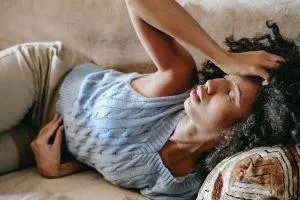
Pain on right side abdomen? Sudden, sharp right abdomen pain? This could be a sign of a gallstone or gallbladder issue. Gallbladder attacks can cause severe gallbladder pain. Acupuncture and TCM can provide an alternative or adjunct treatment for gallstones symptoms.
The gallbladder is a small organ located on the right side of your abdomen, under the liver. The liver produces bile, a liquid that helps break down fats into fatty acids. The gallbladder stores bile and releases it into the small intestine as needed, to help with digestion.
When the bile that your body produces has too much cholesterol or bilirubin in it, or when bile is not draining out of the gallbladder properly, it can become too concentrated and begin to harden into a solid.
Gallbladder pain usually occurs because a person has gallstones, which are just what they sound like: little stones that develop inside the gallbladder and are made up mostly of cholesterol. The medical term for gallstones is “cholilithiasis.”
Many people have gallstones and are not aware of it. It is possible to have gallstones with no symptoms at all.
Top 5 Gallstone Symptoms
People who have gallbladder disease or gallstones are likely to experience a condition known as “biliary colic.” This means that they have an intolerance for fatty foods and may experience dyspepsia, nausea, and/or bloating when they eat something that disagrees with them.
Severe, sharp right side stomach pain is the most common sign of a gallbladder attack, which is when a gallstone becomes lodged in one of the small tubes or ducts that lead to and from the liver, gallbladder, and pancreas.
Gallbladder symptoms may include:
- Pain in lower right abdomen
- Nausea and/or vomiting
- Yellow skin and/or yellow eyes, jaundice
- Fever and/or chills
- Brown pee, brown urine, light-colored poop
Sometimes gallbladder pain can refer to the right shoulder, or between the shoulderblades.
Gallbladder pain can also happen due to inflammation of the gallbladder. This condition is known as cholecystitis and occurs when a gallstone blocks the duct that leads out of the bladder, causing bile and bacteria to build up and become infected.
Stones can sometimes become lodged in the common bile duct, which not only causes pain, but can lead to pancreatitis. Gallstones are the primary cause of acute pancreatitis, in which the pancreas becomes irritated and inflamed due to a backup of bile and/or digestive enzymes.
The pain of a gallbladder attack is unignorable. If it doesn’t go away within a few hours, most people choose to go to the emergency room for urgent care.
Gallstones may pass on their own, or drugs are sometimes used to help dissolve the gallstones. These drugs can be expensive, and sometimes cause problems like atherosclerosis, or fatty buildup in the arteries.
When gallstone pain comes and goes, and the gallstones are present but not causing the blockage of a duct, usually pain management and patience are the only treatment.
If gallbladder issues keep coming up, the typical medical treatment is gallbladder surgery.
Acupuncture can offer an alternative treatment to help relieve gallbladder pain. TCM is considered an effective treatment for biliary colic due to gallbladder disease.
Gallbladder Removal
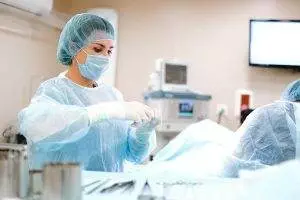
It is very common for people presenting with acute pancreatitis or a gallbladder attack to have a cholecystectomy, or gallbladder removal. Over 300,000 cholecystectomies are performed in the U.S. each year.
While this gallbladder surgery is usually done laparoscopically and is minimally invasive, there are disadvantages to living without a gallbladder.
Some people have what is known as postcholecystectomy syndrome, in which they continue to experience pain on right side abdomen, heartburn, nausea, indigestion, and vomiting, even though their gallbladder is gone.
Some research studies have suggested that gallbladder removal may not be necessary or desirable for everyone. It may be worth considering alternative or adjunct gallbladder pain treatment with TCM and acupuncture.
Can Acupuncture Help Gallbladder Symptoms?
Chinese medicine has been used to treat gallstones for thousands of years, without surgery.
According to TCM theory, the gallbladder is the Yang organ that ideally works cooperatively and in harmony with the Yin liver. The gallbladder is an extraordinary organ in that it is part of the digestive system, but it never comes in direct contact with the food you eat. It stores and secretes bile to help break down fats.
In TCM, we consider the gallbladder to represent the part of our nature that makes decisions, takes action, and feels inspired. When the liver and the gallbladder are not functioning smoothly, we may feel frustrated, angry, and depressed. Repressing anger can exacerbate gallbladder problems, as can eating the wrong foods.

In TCM, the gallbladder is associated with spring, and the wood element. It is best nourished with lots of dark, leafy greens, herbs, roots, and green tea. Eating too many fatty, fried foods, and drinking too much alcohol can have a very negative effect on both the liver and gallbladder.
The stimulation of acupoints along the gallbladder meridian can help to regulate the sphincters of the gallbladder and its action, and help to promote the secretion of bile so that it does not remain stagnant inside the gallbladder.
Acupuncture can also have an analgesic effect that may even be superior to that of NSAIDs pain relief medications, without any of the side effects that may occur with regular use of these drugs.
Acupuncture can also be used to treat chronic cholecystitis, the chronic inflammation of the gallbladder due to infection. TCM treatment can help reduce inflammation and improve immune function so that infections can be more easily fought off.
Acupuncture and TCM can also be used as an adjunct treatment to help boost the efficacy of conventional medications. One study showed that patients who were given cefodizime for chronic cholecystitis and also received acupuncture had a 98% effective rate, as opposed to patients who received the medication only, who had only a 50% effective rate.
There are many Chinese herb preparations designed to help with gallstones. These formulas are based on TCM theories related to clearing the stagnation of Qi and blood in the liver and gallbladder, removing dampness and heat and treating yin deficiency.
These herbs have been shown to help discharge gallstones, control the metabolism of bilirubin, and help to prevent the formation of new stones in the future.
Acupuncture Near Me for Gallbladder Pain in West Los Angeles
Acupuncture and TCM can provide natural treatments for gallstones and many other problems related to the digestive system, such as diarrhea, constipation, Crohn’s disease, colitis, IBS, diverticulitis, and celiac disease. If you are experiencing abdominal pain and other digestive symptoms, consider consulting with a TCM practitioner. Acupuncture can help prevent conditions like gallstones from getting worse.
*This article is for education from the perspective of Traditional Chinese Medicine only. The education provided by this article is not approved by FDA to diagnose, prevent, treat and cure human diseases. It should not stop you from consulting with your physician for your medical conditions. Traditional Chinese Medicine is based on Qi, which is an invisible force that usually cannot be observed by modern science. Because science focuses on testing ideas about the natural world with evidence obtained through observation, these aspects of acupuncture can’t be studied by science. Therefore acupuncture and Chinese herbs are often not supported by double-blind, randomized trials, and they are considered alternative medicine therapies in the United States.
How to Treat Kidney Stones With Acupuncture and TCM
By Qineng Tan, L.Ac., Ph.D. and Xiaomei Cai, L.Ac., Ph.D.
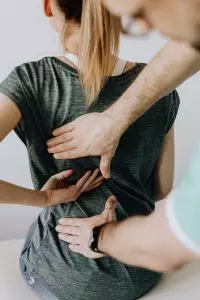
Severe lower back pain, blood in urine, burning pee? These could be signs of kidney stones. Acupuncture and TCM offer an alternative or adjunct kidney stones treatment that can help relieve kidney stone pain and dysuria, or painful urination.
Kidney stones are hard mineral deposits that form in the kidneys or other parts of the urinary tract. Salt and minerals can crystallize when urine reaches a certain level of concentration.
Often, kidney stones form when there are calcium oxalate crystals in urine. Calcium levels can be high because of eating too much sodium.
The ureters are the tubes that connect the kidneys to the bladder. If a kidney stone moves into a ureter and becomes lodged there, it can cause left lower back pain or right lower back pain. This is known as “passing a kidney stone.”
Kidney stones are very common, and many people go to the ER when they are experiencing severe lower back pain on one side and peeing blood. This happens when one or more kidney stones find their way into one of the ureters and become lodged there. This blocks the flow of urine and can cause severe pain and cramping.
Acupuncture can help reduce kidney stone pain in the short term, and help address the imbalances that are the root cause of kidney stones.
What Causes Kidney Stones?
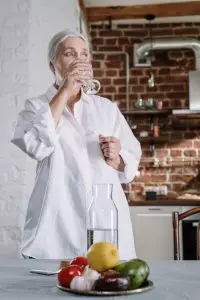
Kidney stones form when there is not enough urine, and it becomes too concentrated. This often is due to not drinking enough fluids and getting dehydrated. Other kidney stone causes include:
- Not drinking enough water, dehydration
- Too much salt
- Too much sugar, fructose, or high fructose corn syrup
- Too much meat, too few fruits and vegetables
- Lack of exercise or too much exercise
- weight loss surgery, bariatric surgery, which can cause chronic diarrhea
- Infections, UTIs
- Gout
- Chronic diarrhea due to Crohn’s disease, ulcerative colitis
- Type 2 Diabetes, high blood sugar levels
Kidney stones are differentiated into different types, depending on their mineral composition. The types of kidney stones are:
- Calcium stones – deposits of calcium oxalate or calcium phosphate
- Uric acid stones – high levels of uric acid can be due to eating a lot of animal proteins
- Struvite stones – can form after a UTI
- Cystine stones – cystinuria is an inherited condition that causes buildup of the amino acid cystine in the urinary tract
Top 10 Symptoms of Kidney Stones
Many people have kidney stones and are not aware of them. It is possible to have kidney stones without pain or kidney stones without urinary symptoms. You may only find out about them when having imaging tests done for some other reason.
However, passing a kidney stone can certainly cause intense pain and other upsetting symptoms. The most common signs of kidney stones include:
- Sharp pain on one side of the lower back
- Cramps in one side
- Pain in the lower abdomen or groin
- Urgent need to pee, urinary urgency
- Peeing a lot, urinary frequency
- Burning sensation when peeing, dysuria
- Dark urine, blood in urine
- Nausea, vomiting
- Pain at the tip of the penis
- Fever and/or chills
Kidney stone pain can range from mild to severe, and it can come and go or be constant.
Acupuncture treatment has been shown to be effective for reducing kidney stone pain when used as an adjunct in emergency medical care settings when someone is waiting for conventional treatment.
Treatment for Kidney Stones
Kidney stones are diagnosed through blood tests and urine tests, which will show if there is too much uric acid, calcium, or other minerals that can cause stones to form. Imaging tests, such as ultrasound, may be able to detect where stones are stuck in the urinary tract.
If a person is passing stones (kidney stones in toilet), they may be analyzed to determine what sort of mineral has formed them.
In many cases, people will be encouraged to wait until the stones pass on their own. In this case, simply drinking adequate fluids and using pain medication to manage the intermittent pain and cramping will be recommended. Medications such as alpha blockers (Flomax) may be prescribed to help relax the ureters.
If the kidney stones are too large to be passed, then surgery may be indicated. Procedures using sound waves are sometimes used to help break up the stones. Surgery using small scopes and instruments can also remove the stones. A stent may be placed in the ureter to help keep it open until swelling goes down and it heals.
Studies have indicated that a combination of medications like Flomax and Chinese herbs may help to expel kidney stones. TCM treatment can help prevent the need for surgery.
Can Acupuncture and Herbs Help Kidney Stones?
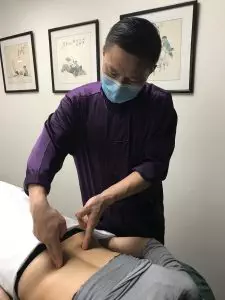
According to TCM theory, kidney stones are in the category of “Shilin” conditions, in which urination is difficult. Chinese herbs have traditionally been used to help balance the electrolyte minerals in the body, which helps prevent stones from forming in the urinary tract.
TCM treatment for kidney stones includes herbal medicine to help increase urine volume and excretion of minerals and inhibits the formation of calcium crystals.
Acupuncture treatment has an anesthetic effect which can help relieve the pain of kidney stones while other treatments take effect to help reduce and prevent the formation of new kidney stones.
One trial found that acupuncture treatment helped relieve kidney stone pain faster than pharmacological medications. Acupuncture treatment has no side effects, while 43% of the people in the study who were given intramuscular anesthesia report side effects like skin rash, irregular heartbeat, and drowsiness.
Acupuncture and acupressure can help relieve severe back pain and pelvic pain due to various urinary and other reproductive system conditions. It can also help reduce the anxiety and depression that people sometimes experience when faced with severe pain.
How to Prevent Kidney Stones
Drinking plenty of water is probably the most important thing you need to do to prevent dehydration and low volume of urine. In addition to staying hydrated, you should:
- Reduce sodium intake by eating less salt and fewer processed and packaged foods.
- Reduce foods that encourage calcium oxalate stones: meats, berries, beer, black pepper, spinach, chocolate/cocoa, and tea.
- Combine calcium-rich foods or drinks with foods that contain oxalate, so that they can be absorbed well together. This could mean eating spinach with cheese, or berries with yogurt. The citrate in citrus juices can also help discourage stone formation.
- Add foods with a high ratio of magnesium to calcium, such as: brown rice, oats, barley, bananas, soybeans, and flaxseeds.
- Be sure to replace lost fluids when you sweat through exercise or by being in a sauna, steam room, or hot tub, or just by being in the heat during the summertime.
- Balance your Ph levels. For some people this may mean increasing alkaline foods. As your acupuncturist about checking your Ph levels.
Acupuncture Near Me for Kidney Stones, Los Angeles
TCM treatment can help reduce pain and address the root causes of many conditions that cause urinary urgency and frequency, like BPH, UTIs, chronic kidney disease (CKD), and interstitial cystitis. Acupuncture can also help relieve pelvic pain and low back pain due to many other conditions, like endometriosis, and mittelschmerz. If you are experiencing urinary symptoms or recurring bladder pain or back pain, consider consulting an experienced acupuncture practitioner to resolve the root issue.
*This article is for education from the perspective of Traditional Chinese Medicine only. The education provided by this article is not approved by FDA to diagnose, prevent, treat and cure human diseases. It should not stop you from consulting with your physician for your medical conditions. Traditional Chinese Medicine is based on Qi, which is an invisible force that usually cannot be observed by modern science. Because science focuses on testing ideas about the natural world with evidence obtained through observation, these aspects of acupuncture can’t be studied by science. Therefore acupuncture and Chinese herbs are often not supported by double-blind, randomized trials, and they are considered alternative medicine therapies in the United States.
How to Treat Interstitial Cystitis With Acupuncture and TCM
By Xiaomei Cai, L.Ac. Ph.D. & Qineng Tan, L.Ac., Ph.D.
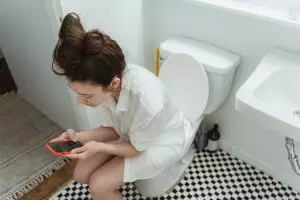
Bladder pain and pressure? Urinary urgency? Pelvic pain that feels like a UTI or bladder infection? Interstitial cystitis is a painful bladder syndrome caused by bladder inflammation. Acupuncture and TCM offer an alternative interstitial cystitis treatment that can help relieve interstitial cystitis symptoms.
Interstitial cystitis is a chronic pain condition that is difficult to diagnose and treat with conventional medicine. It is generally considered a urological or gynecological condition, but actually, men and women can both experience what is sometimes referred to as painful bladder syndrome (IC/PBS) or “frequency-urgency-dysuria syndrome.” Dysuria means “painful urination.”
While interstitial cystitis can be different from person to person, the best way to describe it is feeling like you have the urinary frequency that is characteristic of a UTI or symptoms bladder infection all the time—except that there is no bacterial infection present, so the condition does not get better with antibiotics.
Interstitial cystitis and overactive bladder (OAB) share many of the same signs and symptoms and can sometimes overlap. The primary difference between these two conditions is that interstitial cystitis usually involves pelvic pain in addition to urinary urgency, while overactive bladder involves urinary incontinence, but usually not significant bladder pain.
That feeling of bladder pressure and urinary urgency can really get in the way of your daily activities. People who suffer from interstitial cystitis may feel like they’re going to the bathroom every few minutes all day long. Even though they’re peeing a lot, though, the painful urgency to urinate again returns quickly.
Interstitial cystitis involves irritation and inflammation of the bladder that can ultimately cause a buildup of scar tissue in the bladder and may decrease its capacity to hold urine. There may also be small amounts of blood in the urine (hematuria) due to pinpoint bleeding on the bladder walls.
What Causes Interstitial Cystitis?
Medical science has not yet discovered why some people experience interstitial cystitis (IC). It has been suggested that it may be related to an autoimmune disease attacking the bladder or causing inflammatory cells to develop in the bladder, nerve signals that are causing painful sensations even though nothing is wrong, some type of allergic reaction to chemicals in the urine, or sores developing in the bladder lining.
Some people who suffer from interstitial cystitis may also have IBS, fibromyalgia, migraines, or other chronic pain conditions. There is some evidence that IC is associated with also having an autoimmune condition, such as lupus, rheumatoid arthritis, or a thyroid disorder.
Interstitial cystitis bladder pain is a complex problem with both physical and emotional components. The urgency to pee can become so persistent and painful that it gets in the way of normal life, and even relationships. Fortunately, TCM and acupuncture offer holistic treatment for interstitial cystitis that can help relieve pain and anxiety.
Top 5 Interstitial Cystitis Symptoms
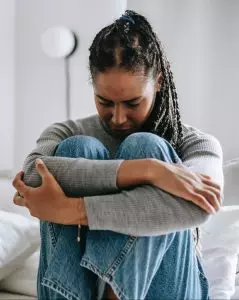
Each person’s experience of interstitial cystitis is unique. For some, the uncomfortable sensations of urinary frequency and bladder pressure may come and go. For others, bladder pain may be constant.
The common symptoms of interstitial cystitis include:
- Urinary frequency, peeing a lot
- Urinary urgency, feeling like you have to pee even when you just went
- Only peeing a small amount when you go
- Bladder pain, bladder pressure, pelvic pain, pain in the perineum
- Pain during sex
Menstruation can cause interstitial cystitis pain to worsen, as can certain foods or drinks, having sex, or sitting for long stretches of time.
Top 10 Triggers of Interstitial Cystitis Pain
People with interstitial cystitis are often advised to keep a record of their eating habits and pay attention to what foods or beverages seem to make their symptoms worse.
Things that may trigger bladder pain include:
- Tomatoes
- Citrus fruits
- Alcohol
- Caffeine – coffee, tea
- Carbonated beverages, soda, pop
- Fruit juice
- Chocolate
- Artificial sweeteners
- Milk and other dairy foods
- Spicy foods
Going on an elimination diet, in which you avoid certain foods for a period of time and see if your symptoms abate, may help.
Interstitial Cystitis Treatment
Medical treatment for interstitial cystitis is focused mainly on mitigating symptoms. Painkillers, antihistamines, and antidepressants are most commonly prescribed to help relieve painful bladder syndrome.
Amitriptyline is approved to treat depression, but is sometimes used to help treat autoimmune-related chronic pain due to fibromyalgia and MS, as well as interstitial cystitis.
Elmiron is a drug specifically approved to help protect the lining of the bladder from irritation. It can take several months for it to start working. It has some serious side effects, including potentially permanent damage to the retinas of the eyes.
Bladder instillations for interstitial cystitis are “cocktails” of medicines that are injected into the bladder with a catheter and held for 15-30 minutes. Treatments may be given weekly or a few times per week over the course of several weeks. Some people get relief from their symptoms with this method. Others may find the catheterization process uncomfortable or painful.
None of these treatments are a cure for interstitial cystitis. TCM and acupuncture offer an alternative treatment for painful bladder syndrome that can relieve pain and address the root cause of the problem.
Can Acupuncture Help Interstitial Cystitis?
According to TCM, the healthy function of the bladder relies heavily on the kidney and spleen, which provide yang energy to warm the bladder. When the Kidney Qi is deficient, the bladder may be too weak to hold urine.
Kidney Qi can be weakened by a long illness, or by repeated UTIs that have not been adequately addressed. It has been noted through medical imaging that prolonged illnesses can cause the bladder to contract in size. It can also become much more sensitive.

Painful urination can begin after someone has a difficult childbirth or other trauma to the pelvic organs. This can have consequences that affect someone both physically and emotionally.
Stagnation of Liver Qi can occur due to a strong emotional upset or depression. The Liver channel moves around and through the pelvis and external genital organs, so when Liver Qi is not moving freely, it can lead to pain or dysfunction in this area. Particularly if Liver Qi has too much heat, it can negatively impact the function of the bladder and pelvic floor area.
To determine what is causing interstitial cystitis pain, an acupuncturist will look carefully at other, seemingly unrelated symptoms that person is experiencing.
For example, if bladder pain is accompanied by fatigue, ear ringing (tinnitus), and cold hands and feet, those are all indicators that Kidney Yang is deficient and cold. Ears are considered to be the opening of the Kidney meridian.
If they are thirsty all the time, have a lot of allergies, warm hands, and tend to feel anxious, these are signs that Kidney Yang is too hot.
An acupuncture treatment protocol will then be developed accordingly to address both the pain and pressure on the bladder, as well as the underlying conditions that are causing imbalances in the organ systems.
Moxibustion treatment and electro-acupuncture may also be used to help relieve bladder pain symptoms.
One study in which patients diagnosed with interstitial cystitis were given one acupuncture treatment per week for four consecutive weeks found that urinary frequency was significantly decreased.
Another study showed that a majority of patients who received weekly acupuncture for three months showed significant improvement or complete relief from urinary symptoms.
Another study suggested that acupuncture treatment may help to relieve bladder irritation and urgency by helping to block nerve impulses around the urethra, the neck of the bladder, and the pelvic floor area.
Acupuncture Near Me for Interstitial Cystitis
Acupuncture is a particularly good modality for helping to treat complicated issues when conventional medicine is not working. Interstitial cystitis is still not well understood by modern science, but TCM methods work well to relieve both physical and emotional pain associated with painful bladder syndrome. If you are experiencing urinary frequency and bladder pressure, but know that you don’t have an infection, please consider giving acupuncture a try.
*This article is for education from the perspective of Traditional Chinese Medicine only. The education provided by this article is not approved by FDA to diagnose, prevent, treat and cure human diseases. It should not stop you from consulting with your physician for your medical conditions. Traditional Chinese Medicine is based on Qi, which is an invisible force that usually cannot be observed by modern science. Because science focuses on testing ideas about the natural world with evidence obtained through observation, these aspects of acupuncture can’t be studied by science. Therefore acupuncture and Chinese herbs are often not supported by double-blind, randomized trials, and they are considered alternative medicine therapies in the United States.
How to Treat Ovulation Pain With Acupuncture and TCM
By Xiaomei Cai, L.Ac., Ph.D. and Qineng Tan, L.Ac., Ph.D.
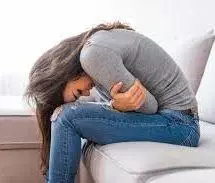
Cramping during ovulation, ovary pain, ovulation pain on one side? Ovulation cramps are very common. Acupuncture and TCM can help ease severe ovulation pain and help with all kinds of ovulation disorders.
The medical term for ovulation pain is “Mittelschmerz,” which means “middle pain” in German. The term Mittelschmerz syndrome refers to the fact that ovulation cramps occur in the middle of the menstrual cycle, typically about 14 days before the next menstrual period.
Studies have suggested that 35-50% of people who ovulate experience cramping during ovulation. Other ovulation symptoms include:
- Ovulation pain on one side
- Pelvic pain, abdominal pain
- Dull ache or sharp twinge of pain in pelvis
- Vaginal pain during ovulation, vaginal cramps
- Cervical cramps, cervix cramps, cervical pain
- Pain around or near the tailbone, tailbone pain
- Back pain, hip pain, or rib pain
- Bloating, bloated stomach
- Fatigue
- Breast tenderness
- Mood swings
- Spotting
- Nausea
- Diarrhea
- Lack of appetite
The process of ovulation involves luteinizing hormone (LH) stimulating follicles on the ovary to mature then break free from the ovary and move through the fallopian tube.
Follicles are like small cysts which stretch the surface of the ovary and then rupture. Blood and other fluids may be released, and this may be part of what causes pelvic pain during ovulation.
Estrogen levels are usually at their highest at the time of ovulation, which can contribute to water retention and uncomfortable bloating in the pelvic area.
For people who are trying to get pregnant, ovulation pain and fertility—or ovulation pain and pregnancy success—may seem related, because the cramping lets them know when they are most fertile.
Many people never notice any signs of ovulation if they aren’t specifically watching for them. For some, ovary pain during ovulation is a sharp cramp that only lasts a few minutes, or a few hours. For others, ovulation pain and pelvic cramps can be so severe that they are debilitating.
Acupuncture and TCM treatment can help relieve ovulation cramps and help regulate hormones to alleviate other ovulation symptoms and problems, as well.
What Causes Ovulation Pain?
Why do some people experience more severe ovulation pain than others? Medical science has not determined exactly why some people experience pain during ovulation and others don’t.
Sometimes ovulation pain can be so bad that people go to the emergency room. In this case, doctors will want to rule out other possibilities. Many conditions can cause pelvic pain, including:
- Appendicitis
- Constipation
- UTI
- IBS
- Celiac disease
- Interstitial cystitis
- Kidney stones
- Gallbladder attack
- Ulcer
- STIs
- Bowel obstruction
- Hernia

Pelvic pain that is related to the reproductive organs can include:
- Menstrual cramps, PMS, dysmenorrhea, painful periods
- Ovarian cyst, ruptured ovarian cyst, twisted ovarian cyst
- Endometriosis
- Uterine fibroids, leiomyoma of the uterus
- Pregnancy
- Ectopic pregnancy
- Pelvic inflammatory disease
- Scar tissue in the pelvic area
- Cancers of the reproductive organs
These conditions not only cause pain, but may interfere with fertility if and when you are ready to conceive.
Endometriosis Ovulation Pain or Ovarian Cyst Pain?
Ovary pain may be related to other issues, apart from ovulation.
Some women begin to experience more ovulation pain when they are going through perimenopause, due to changing estrogen levels.
Ovarian cysts—sacs filled with fluid that develop on the ovaries—are very common. These usually form during ovulation and then go away on their own. However, in some instances, they grow larger, and can cause considerable pain.
Signs of ovarian cyst may be a constant ache, or one that comes and goes, or sudden, sharp pains that happen occasionally. Other ovarian cyst symptoms include: bloating, swelling, and pressure in the pelvic area. If the cyst ruptures, there may be a very sudden, severe pain on one side, and if the cyst becomes twisted or torqued, there may be severe pain accompanied by nausea or vomiting.
Polycystic ovarian syndrome (PCOS) is a hormonal condition in which a person does not ovulate regularly. In many cases, lots of small cysts form on the ovaries, which can cause bloating and pelvic pain.
Ovulation pain can be differentiated from PCOS or ovarian cyst pain mainly by the fact that it occurs only during a specific window of time during the ovulation cycle. If you are using a fertility calculator (ovulation calculator) to track your cycle, then you may be more aware of how your ovulation cycle works and when your fertile window is going to occur.
Endometriosis is a condition in which uterine lining tissues develop in other areas of the body, particularly on the ovaries and fallopian tubes. One of the primary symptoms of endometriosis is pelvic pain, which can be severe and happen at any time during the menstrual cycle. Some people report increased pain during ovulation, as well as severe menstrual pain.
Endometriomas (also known as “chocolate cysts”) can develop in and around the ovaries. There can also be scar tissues, or adhesions, around the ovaries. These tissues may contribute to the increased pain ovulation can cause when you have endometriosis. In these cases, the pain may radiate to other areas, even down to the thighs. Having sex may also be painful around the time of ovulation.
It is important to consult with a health professional if you are experiencing ovary pain, vaginal pain or severe menstrual pain.
PCOS and endometriosis not only cause pain and other uncomfortable symptoms, but can lead to infertility.
If your periods are irregular, or you have reason to suspect that you are not ovulating, it is important to seek health care. Severe pain or missed periods may be sending a signal that there is a deeper issue that needs to be addressed.
Treatment for Ovulation Pain
Ovulation pain may not occur every month. Some people may get relief from occasional ovulation pain by taking over the counter pain relievers like ibuprofen.
If ovary pain is happening frequently and is unbearable, a doctor may recommend hormonal birth control, like oral contraceptives or the Nuvaring. These birth control methods suppress ovulation, and therefore prevent mittelschmerz. However, hormonal birth control can have other negative side effects, and is not suitable for those who may be trying to get pregnant.
Can Acupuncture Help Ovulation Pain?
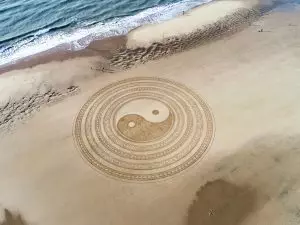
In TCM, we see ovulation as being a transition from Yin dominant energy to Yang dominant energy. The Yin energy has built up to the point when the egg is released, then Yang energy warms the uterus to prepare it for potential conception.
If there is stagnant Qi (life force energy) in the organ systems, this can cause the intense cramps some people experience during ovulation.
Acupuncture treatment, herbs, and the right nutrition can help move Qi and blood. The smooth flow of Liver Qi, in particular, is essential to not only enhance fertility, but to help ovulation and menstruation occur without blockages that cause pain.
Acupuncture and Chinese herbs have been shown to help relieve all types of gynecologically related pelvic pain, including endometriosis pain, menstrual pain, and period back pain.
Acupuncture treatment has a natural effect on the key hormones involved in follicle development, ovulation, and menstruation: estrogen, progesterone and prostaglandins. Balancing these hormones can help to regulate ovulation when it is not occurring, and also to help relieve cramps, tension, and other symptoms.
Top 3 Acupressure Points for Ovulation Pain
Here are some acupoints for ovulation cramps that you can use to help relieve pelvic pain.
- “Sea of Qi” CV6 – 1-2 inches below belly button, massage in a circular motion for at least a minute
- San Jiao Jiu CA6- 2 points that make a triangle with the navel, press firmly
- Zigong Ren Channel 3 – 4-5 inches below the belly button, press firmly for a minute
Acupuncture Near Me for Ovulation Pain
Whether you are experiencing monthly ovulation cramping, not sure when or if you are ovulating, or suspect that you may have PCOS, endometriosis, or fibroids, TCM and acupuncture offer a highly effective alternative treatment for gynecological issues. The doctors at Art of Wellness are highly respected experts when it comes to fertility treatment and women’s health. Their unique knowledge of Western gynecology and obstetrics combined with TCM allows them to work with you and your individual situation.
*This article is for education from the perspective of Traditional Chinese Medicine only. The education provided by this article is not approved by FDA to diagnose, prevent, treat and cure human diseases. It should not stop you from consulting with your physician for your medical conditions. Traditional Chinese Medicine is based on Qi, which is an invisible force that usually cannot be observed by modern science. Because science focuses on testing ideas about the natural world with evidence obtained through observation, these aspects of acupuncture can’t be studied by science. Therefore acupuncture and Chinese herbs are often not supported by double-blind, randomized trials, and they are considered alternative medicine therapies in the United States.
How to Treat Diverticulitis With Acupuncture and TCM
By Qineng Tan, L.Ac., Ph.D. and Xiaomei Cai, L.Ac., Ph.D.
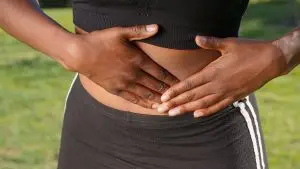
Pain in lower left abdomen? Stomach pain or pain in lower abdomen? Nausea, vomiting? Constipation or diarrhea? These may be diverticulitis symptoms. Acupuncture and TCM offer a way to help relieve diverticulitis pain and restore normal bowel function.
Diverticulosis refers to the presence of small sacs or pouches of tissue inside the large intestine, most often the colon (colonic diverticulitis), which are called “diverticula.”
Diverticulitis refers to the condition that occurs when the sacs become inflamed and infected. Diverticulitis causes pain and other symptoms like bloating and pain in left abdomen that might feel better after you pass gas or have a bowel movement.
Diverticular disease is becoming more and more common and is particularly widespread amongst older people, with at least half of all people over the age of 60 showing signs of diverticulosis.
While medical science has not definitively determined why people develop diverticulosis, it is believed to be due to eating a diet that is low in fiber and high in fatty foods like red meat.
Sedentary lifestyle (lack of exercise), being overweight or obese, smoking cigarettes, and regular use of anti-inflammatory medications or OTC pain medications (NSAIDs) may also be factors in the development of diverticulosis.
Many people have diverticulosis but are unaware of it because they don’t have any symptoms. It is only when the diverticula become infected and inflamed that diverticulitis treatment becomes necessary.
Acupuncture and TCM offer an alternative diverticulitis treatment that can help relieve pain and reduce inflammation in the colon.
Top 5 Diverticulitis Symptoms
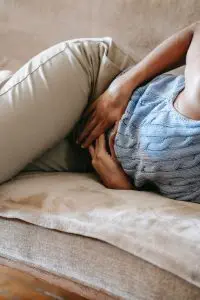
Diverticulitis symptoms are believed to occur because something like a bit of undigested food or stool becomes trapped inside one of the diverticula, and then bacteria start to grow, causing an infection.
While a person can have diverticulosis for a long time without any signs, symptoms of diverticulitis may come on suddenly and be quite severe.
The common signs of diverticulitis include:
- Abdominal pain or cramping, particularly pain in lower left abdomen—although in Asian countries, pain in lower right abdomen seems to be more prevalent. The pain may be constant, or it can come and go.
- Nausea and/or vomiting
- Fever and/or chills
- Constipation or diarrhea
- Rectal bleeding, bloody stool
Sometimes diverticulitis may cause a total lack of appetite and sudden weight loss, as a person just stops feeling like eating anything.
Diverticulitis can sometimes lead to more serious complications, like an abscess—which is when the infected area swells and fills with pus—or perforation of the bowel wall. These kinds of issues may require surgery.
Diverticulitis Treatment
Some other gastrointestinal disorders can present with symptoms that are similar to those of diverticulitis, such as: colitis or inflammatory bowel disease, IBS (irritable bowel syndrome), or bowel obstruction. Gynecological problems like endometriosis, an ovarian cyst, or an ectopic pregnancy could also cause severe pain in the lower left abdomen. A UTI could also cause acute abdominal pain.
Diagnosis of diverticulitis will usually begin with a doctor feeling the abdomen for signs of tenderness, then they will order tests (blood tests, urine tests, and/or stool tests) to check for infection. Once other problems have been ruled out, a CT scan may show the diverticula (infected sacs/pouches in the large intestine).
There is some debate about when to perform a colonoscopy in cases of diverticulitis, as the procedure can cause perforations of the intestinal lining to become worse. Usually, a colonoscopy is recommended several weeks after a person has recovered from an acute attack of diverticulitis.
Because diverticulitis is usually caused by an infection, the most common medical treatment is a course of antibiotics, along with rest and pain relievers, until the acute symptoms have abated. A liquid diet may be indicated until the situation improves, with the gradual reintroduction of solid foods.
Recommendations will usually include that a person quits smoking (if they smoke) and makes changes in their diet: especially eating less meat and fatty foods and increasing fiber intake. It used to be common for doctors to tell their patients not to eat foods like popcorn, seeds, or nuts, under the assumption that small, hard kernels might become trapped in the diverticula and cause irritation. However, more research has shown that eating these types of foods does not seem to cause flare-ups of diverticulitis.
If these treatments do not help to relieve diverticulitis pain, or if a complication like an abscess or perforation in the colon wall develops, surgery may be necessary. The most common surgery for diverticulitis is a colon resection, which involves removing the part(s) of the large intestine that have been damaged. Sometimes it is not possible to repair the colon completely, and in these cases, a person may have to have a colostomy.
Acupuncture and TCM offer an alternative or adjunct treatment for diverticulitis that can help reduce inflammation in the bowel and relieve abdominal pain.
Can Acupuncture Help Diverticulitis?
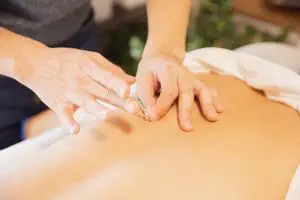
An acupuncturist will make a TCM diagnosis based on where and what kind of abdominal pain and other diverticulitis symptoms a patient is experiencing. According to TCM theory, pain and problems with the digestive organs can be related both to stagnant Qi (life energy) or blood in that area, and the presence of a pathogenic force like dampness, heat, or cold.
The quality of diverticulitis pain and how it changes when you eat or move your bowels will provide clues as to what the root cause is.
In TCM, the spleen is considered to be responsible for turning nutrients into energy; when it is not functioning well, a person may have diarrhea. Strengthening the spleen is usually an important part of TCM treatment for diverticulitis and other digestive disorders.
Your acupuncture practitioner can help relieve symptoms like nausea, constipation, diarrhea, bloating, and stomach pain, while also helping to heal and strengthen the lining of the intestines and reducing inflammation. Boosting immune function will help prevent further infections.
It is generally necessary for a person with diverticulosis to make changes in their dietary habits. While increasing intake of fiber and fluids is important, there are probably even more specific foods that are triggering the dysfunction of the gastrointestinal system, creating excess heat or dampness in the internal organs. TCM nutrition views all foods as having properties that either cool or warm the body. So, your acupuncturist will be able to advise you on what food program will work best to balance your health.
In general, nourishing broths, soups, and well-cooked vegetables with lean proteins and whole grains with plenty of fiber are the best diet for people with diverticulitis. Avoid cold, raw foods, fatty foods, red meat, and dairy.
Acupuncture Near Me for Diverticulitis In West Los Angeles
Acupuncture and TCM provide an effective way to treat abdominal pain and gastrointestinal disorders of all kinds. At Art of Wellness, we have over 35 years of experience helping people find pain relief and improve their digestive health.
*This article is for education from the perspective of Traditional Chinese Medicine only. The education provided by this article is not approved by FDA to diagnose, prevent, treat and cure human diseases. It should not stop you from consulting with your physician for your medical conditions. Traditional Chinese Medicine is based on Qi, which is an invisible force that usually cannot be observed by modern science. Because science focuses on testing ideas about the natural world with evidence obtained through observation, these aspects of acupuncture can’t be studied by science. Therefore acupuncture and Chinese herbs are often not supported by double-blind, randomized trials, and they are considered alternative medicine therapies in the United States.